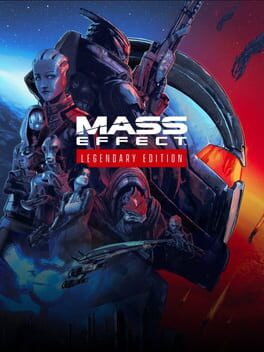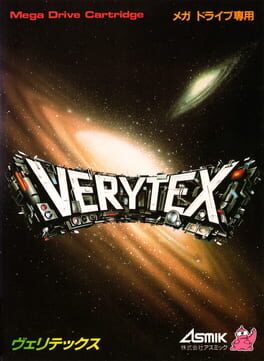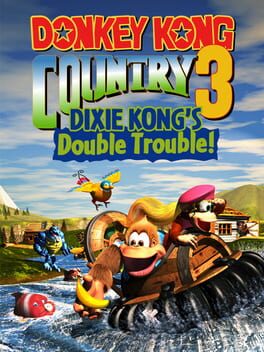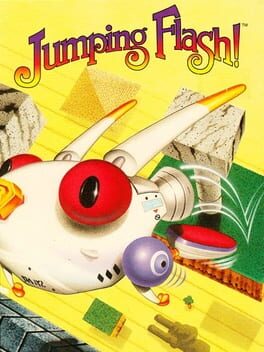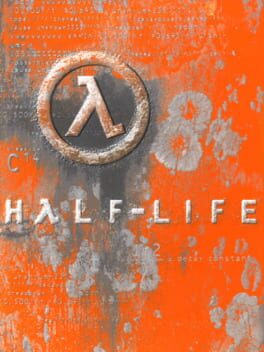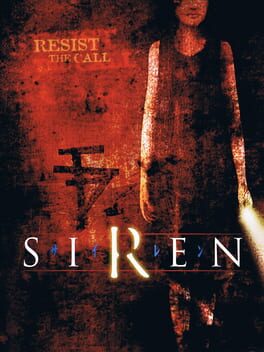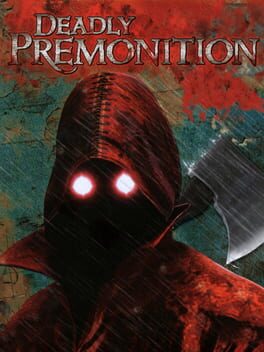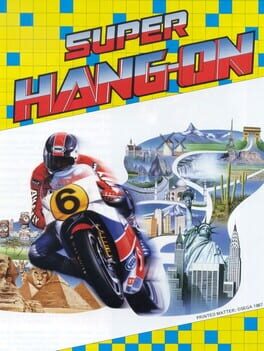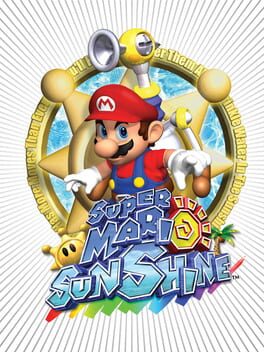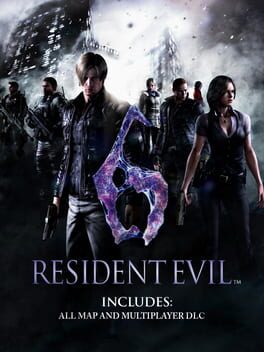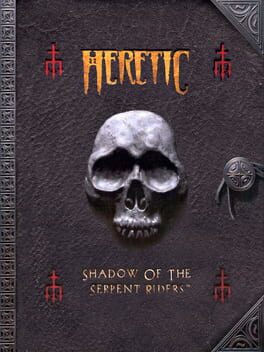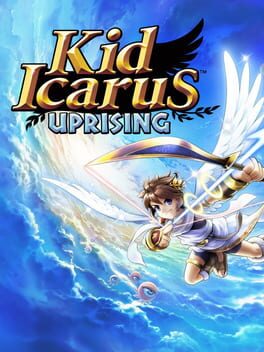DJSCheddar
1517 Reviews liked by DJSCheddar
Verytex
1991
I can't think of any shmup that's more unbalanced than this. When you're fully-powered up, your destroy basically everything and your shield can absorb a ton of hits. But dying once sends you back to the START of the stage, with no power-ups.
I got up to Stage 6 without dying once, but then took a hit from a block that spawned literally into thin air. Lost every single power-up and got sent back to the start of the level, and no matter how many times I tried, I couldn't get past the first 10 seconds without my power-ups.
I didn't 'hate' the portions leading up to that part, it's still fairly fun and has a good OST, but I can't think of any moment in a shmup that felt more demoralizing and frustrating than this. To grind your way through this slow-ass easy-ass game for what feels like 40 minutes and suddenly throw it all away because of a single fucking block.
Fuck this game lol
I got up to Stage 6 without dying once, but then took a hit from a block that spawned literally into thin air. Lost every single power-up and got sent back to the start of the level, and no matter how many times I tried, I couldn't get past the first 10 seconds without my power-ups.
I didn't 'hate' the portions leading up to that part, it's still fairly fun and has a good OST, but I can't think of any moment in a shmup that felt more demoralizing and frustrating than this. To grind your way through this slow-ass easy-ass game for what feels like 40 minutes and suddenly throw it all away because of a single fucking block.
Fuck this game lol
Since I loved Donkey Kong Country 2: Diddy's Kong Quest so much, I had a gut feeling that the third installment in the series wouldn't top the second or even the first game. I tried not to go into the game with this mentality, but I just couldn't shake that feeling, and it unfortunately turned out to be true. Even if I wasn't expecting it to be as good as the first two games in the Donkey Kong series, Donkey Kong Country 3: Dixie Kong's Double Trouble! is a huge downgrade in terms of level design and memorability, even if the end result is still a good game.
Donkey Kong Country 3: Dixie Kong's Double Trouble! has the design philosophy of a New Super Mario Bros. game, where all of the game's levels have at least one gimmick in them. While some of the levels in the first two games did have one-off gimmicks, they were far more interesting than what is present here, as many of the gimmicks in this game's levels feel like they were added just to annoy the player rather than to pose any actual challenge. Speaking of which, Donkey Kong Country 3: Dixie Kong's Double Trouble! is way easier than the first two games in the series, and the lowered difficulty combined with the gimmick-heavy level design leads to a generally forgettable experience.
Aside from all of that, there are some positives about the game that remain consistent with what was present in its predecessors. The visuals, sound design, and general atmosphere are still great (Even if the character designs are the worst in the series), and while Eveline Fischer's score isn't nearly as memorable or catchy as David Wise’s work on the first two games, she still did a good job here. Overall, Donkey Kong Country 3: Dixie Kong's Double Trouble! is still a good game, although it's nowhere near as good as its predecessors and I'm much less eager to revisit this game than I am to revisit the first two Donkey Kong games.
Donkey Kong Country 3: Dixie Kong's Double Trouble! has the design philosophy of a New Super Mario Bros. game, where all of the game's levels have at least one gimmick in them. While some of the levels in the first two games did have one-off gimmicks, they were far more interesting than what is present here, as many of the gimmicks in this game's levels feel like they were added just to annoy the player rather than to pose any actual challenge. Speaking of which, Donkey Kong Country 3: Dixie Kong's Double Trouble! is way easier than the first two games in the series, and the lowered difficulty combined with the gimmick-heavy level design leads to a generally forgettable experience.
Aside from all of that, there are some positives about the game that remain consistent with what was present in its predecessors. The visuals, sound design, and general atmosphere are still great (Even if the character designs are the worst in the series), and while Eveline Fischer's score isn't nearly as memorable or catchy as David Wise’s work on the first two games, she still did a good job here. Overall, Donkey Kong Country 3: Dixie Kong's Double Trouble! is still a good game, although it's nowhere near as good as its predecessors and I'm much less eager to revisit this game than I am to revisit the first two Donkey Kong games.
people talk about this game like it's some groundbreaking, breathtaking, wonderful pinnacle of video games and i really wish i understood that. this game feels really nice to move around in, its visuals are really appealing and its score is pretty cute. but there's not much of a real narrative (or writing at all), no memorable characters, no cool side-quests, no dungeons, a pitiful lack of enemy variety + almost no bosses, and nothing that made exploring feel worthwhile. most of it feels like filler check-list fluff (towers, shrines, koroks). the world is well-designed but there's not much substance inside of it beyond its sandbox elements. i genuinely feel like, insane for not liking this the way people talk about it but i just do not see it personally. it's just okay!
Jumping Flash!
1995
Astro's Playroom
2020
A top tier platformer in its own right, but also one of the best pieces of fanservice ever and definitely the best self-reflexive launch title for a new console generation. Totally craven and shrewd in its constant Playstation referentiality but also so positive and effusively disarming that you cant help but feel swept up by the uncynical celebration of 30 years of productz and all the deeply personal memories they carry. Wonderfully surprising in its inclusivity and niche references--I mean a Vib Ribbon shoutout??? I screamed!!! The whole "little elves performing inside the TV/radio/console making it work" motif is used so charmingly here, and the astrobots feel like a thoughtful avatar for both player communities and a tribute to game developers themselves. Really affirming to see something hail in a new console generation not by fetishizing specs or horsepower but by charting a celebratory lineage of experiences and embracing what's to come as a continuation of that legacy rather than a MODERNIZATION BULLDOZER overwriting it.
my one complaint is that the terrifying weeping baby from those launch-era ps3 commercials got NO inclusion when they are clearly iconic and due for a positive re-appraisal!!!
my one complaint is that the terrifying weeping baby from those launch-era ps3 commercials got NO inclusion when they are clearly iconic and due for a positive re-appraisal!!!
Half-Life
1998
Siren
2003
if silent hill 2 chose to take the path of character study through environment & enemy design that the original silent hill created potential for, then siren chose to build upon sh1's fascination with the occult and the opaque culture and backstory behind the town. for a long time i felt like the cult stuff in sh1 makes it inferior to its sequel, as if it was nerdy lore that got in the way of directly tackling how characters' motivations are projected externally. i don't feel this way as strongly now, but i do think siren is the better exploration of "cult stuff", things that writers toyama and sato are clearly into, than how it was explored in the previous project they worked on.
this is partly due to siren being more formally experimental and more challenging to the player, in more ways than one. you've heard plenty about siren's cryptic gameplay, making it impossible without outside help, and toyama has stated that this was intentional. the aim was that there would be discussions about the game's story content AND figuring out how to progress, influenced by japanese arcades having notebooks in which players wrote hints and secrets for helping others through infamously difficult games, like tower of druaga. we can't engage in that kind of at-the-moment discussion at this point of course, but looking up walkthroughs or otherwise asking others online for help in how to complete, or even just unlock, the second objectives fulfills a similar purpose: engaging with internet as part of the experience of the game.
understanding that is key, as siren both frames itself as inextricable from the internet AND replicating the experience of taking in information through the internet. the game aims to disorient you in the same way the internet disorients your sense of time and space of things: the timeline-jumping plot with 10 playable characters with an excel-grid link navigator as the hub, the sterile and "objective" feeling menu ui, the archive of collectable items of which the descriptions contains the majority of story information, the fact that some of the story exists outside the game itself online in the form of extra short stories, fake forums posts, in-fiction websites that might be gone by now. all this gives the game an impression that you are lost in a labyrinth of databases as you learn more and more, colored by anthropological annotations and paranormal conspiracies--some of them actual real ones being referenced.
siren is a game with a looming sense of doom, leaving you fumbling to make sense of it, only able to come away with reasonable interpretations of things at best. it handles that slow slide into hopelessness better than any horror game i can think of, and that database-atmosphere works to make it feel like it's with your own gradual understanding of things, not just the plot beats, that this slide can be applied to. siren 2 is close to being as good, and many would reccommend it as the friendlier experience, BUT (besides its combat being worse and the plot not having as much impact) its missing what gave siren 1 its lasting impression for me, and thats its daringness to have you unable to grasp at both the full story AND its gameplay sequences on your own. whether asking someone on discord or looking into a years old gamefaq written by some ancestor, siren having you tackle that communal aspect makes it feel ahead of its time, predicting how soulsborne games would do it years before demon's first tried it.
this is partly due to siren being more formally experimental and more challenging to the player, in more ways than one. you've heard plenty about siren's cryptic gameplay, making it impossible without outside help, and toyama has stated that this was intentional. the aim was that there would be discussions about the game's story content AND figuring out how to progress, influenced by japanese arcades having notebooks in which players wrote hints and secrets for helping others through infamously difficult games, like tower of druaga. we can't engage in that kind of at-the-moment discussion at this point of course, but looking up walkthroughs or otherwise asking others online for help in how to complete, or even just unlock, the second objectives fulfills a similar purpose: engaging with internet as part of the experience of the game.
understanding that is key, as siren both frames itself as inextricable from the internet AND replicating the experience of taking in information through the internet. the game aims to disorient you in the same way the internet disorients your sense of time and space of things: the timeline-jumping plot with 10 playable characters with an excel-grid link navigator as the hub, the sterile and "objective" feeling menu ui, the archive of collectable items of which the descriptions contains the majority of story information, the fact that some of the story exists outside the game itself online in the form of extra short stories, fake forums posts, in-fiction websites that might be gone by now. all this gives the game an impression that you are lost in a labyrinth of databases as you learn more and more, colored by anthropological annotations and paranormal conspiracies--some of them actual real ones being referenced.
siren is a game with a looming sense of doom, leaving you fumbling to make sense of it, only able to come away with reasonable interpretations of things at best. it handles that slow slide into hopelessness better than any horror game i can think of, and that database-atmosphere works to make it feel like it's with your own gradual understanding of things, not just the plot beats, that this slide can be applied to. siren 2 is close to being as good, and many would reccommend it as the friendlier experience, BUT (besides its combat being worse and the plot not having as much impact) its missing what gave siren 1 its lasting impression for me, and thats its daringness to have you unable to grasp at both the full story AND its gameplay sequences on your own. whether asking someone on discord or looking into a years old gamefaq written by some ancestor, siren having you tackle that communal aspect makes it feel ahead of its time, predicting how soulsborne games would do it years before demon's first tried it.
Deadly Premonition
2010
6 stages of enlightment:
1. dp is bad
2. dp is so bad its good
3. dp is good in a genuine way, despite the controls and graphics and everything else besides the story and characters being bad
4. dp is good in a genuine way.
5. the endgame and the final bosses are bad for reasons relating to how dp treats its characters in need of the most crucial care, with the turn of events throughout being too dumb for its own good. and in retrospect the sequel may have only made it obvious that swery is not all that great of a writer, as far as the main stories around his protags and major supporting characters in general goes. every other problem with the game that has been talked to death about, i really dont care. the scale of greenvale and the scripted lives of its residents remind me that swery is a genuinely good director/designer if nothing else (not to ascribe too much credit to him over others). york in this game is a neurodivergent king and im not interested in anything to the contrary. the lynch comparison is inevitable even if its a little overspoken, and you can say that swery's attempt to translate the humanity of loss that made twin peaks what it is yielded mixed results, at the very best, of dp's climax. but expressing mundanity in the weird is dp's greatest asset; its more self-aware in its camp than it will get credit for, and it is always sincere in its ambitions to make the player become accustomed to both the socially oblivious weirdo you play as and the people of a pacific northwest town that is not so far off from him in their own quirks. and i think it does have some humanity in its more understated moments, particularly the series of sidequests that kicks off after talking to anna's mother, or from talking to certain character once they are arrested. even if there is some kind of auteur excess type ugliness to be found underneath the "ugliness" of the gameplay that is truly not as bad as its made out to be, sometimes monotonous and something to just get out of the way wrt the combat sections at worst imo--it can never detract from the passion within this game i feel when i am simply in it, without any flair or tonal whiplash to disturb that. a lifechanger for me that, in all the ways that really matter, still mostly deserves that title.
6. tee hee (executes a mathematically perfect 90 degree turn with a flick of the e-brake, blowing off the police investigation YET AGAIN to collect [Right Hand Bone] while york feeds me tremors movies trivia bc im about to starve to death) yay!
1. dp is bad
2. dp is so bad its good
3. dp is good in a genuine way, despite the controls and graphics and everything else besides the story and characters being bad
4. dp is good in a genuine way.
5. the endgame and the final bosses are bad for reasons relating to how dp treats its characters in need of the most crucial care, with the turn of events throughout being too dumb for its own good. and in retrospect the sequel may have only made it obvious that swery is not all that great of a writer, as far as the main stories around his protags and major supporting characters in general goes. every other problem with the game that has been talked to death about, i really dont care. the scale of greenvale and the scripted lives of its residents remind me that swery is a genuinely good director/designer if nothing else (not to ascribe too much credit to him over others). york in this game is a neurodivergent king and im not interested in anything to the contrary. the lynch comparison is inevitable even if its a little overspoken, and you can say that swery's attempt to translate the humanity of loss that made twin peaks what it is yielded mixed results, at the very best, of dp's climax. but expressing mundanity in the weird is dp's greatest asset; its more self-aware in its camp than it will get credit for, and it is always sincere in its ambitions to make the player become accustomed to both the socially oblivious weirdo you play as and the people of a pacific northwest town that is not so far off from him in their own quirks. and i think it does have some humanity in its more understated moments, particularly the series of sidequests that kicks off after talking to anna's mother, or from talking to certain character once they are arrested. even if there is some kind of auteur excess type ugliness to be found underneath the "ugliness" of the gameplay that is truly not as bad as its made out to be, sometimes monotonous and something to just get out of the way wrt the combat sections at worst imo--it can never detract from the passion within this game i feel when i am simply in it, without any flair or tonal whiplash to disturb that. a lifechanger for me that, in all the ways that really matter, still mostly deserves that title.
6. tee hee (executes a mathematically perfect 90 degree turn with a flick of the e-brake, blowing off the police investigation YET AGAIN to collect [Right Hand Bone] while york feeds me tremors movies trivia bc im about to starve to death) yay!
Super Hang-On
1987
Skimming each turn, toggling your speed, weaving past other racers, riding into that dithered sky - this game's a treat. It's hard as hell, but each failed attempt still feels one step closer to the end than before, and mastering each course is immensely rewarding. All four background tracks evoke this amazing mellow feeling that's one part motivating and another part nostalgic.
I love this game man. Absolutely stellar Yu Suzuki experience.
I love this game man. Absolutely stellar Yu Suzuki experience.
Super Mario Sunshine
2002
set aside takes on whether the game is good or whatever. the rating is tied to how much i loved it as a kid, i havent finished replaying and there are more important things to discuss anyway:
mario goes to fucking JAIL. you ever think about that? i mean sit down, and really think about it. i think our society has normalised the fact that mario goes to jail in super mario sunshine. dude literally gets taken to court and handed a sentence. this would NEVER happen in a mario game today. and here it is, in the first 10 minutes. then he has to do community service??? THEY EVEN MADE WANTED POSTERS. i think if you suggested this as a plot for any big nintendo IP you'd get laughed at. can you imagine the next pokemon game starting like this? this game came out in 2002, and truthfully, i am nowhere near old enough to remember people's immediate reactions to it. but i think more games should send their protagonists to jail. ignoring that the plot here is a retread of one of the greatest written games of all time, sonic adventure 2, which came out a year before sunshine, this was a very bold move for the series.
i had to look up the name of the wonderful writer who decided to send mario to jail - makoto wada. interestingly, this is his only writing credit for a mario game (besides 2000's mario artist for the 64DD). can you imagine the state of the mario canon if it was left in his hands? you know those joke games with fake box art with like, "Yoshi Commits Tax Fraud". you ever think about how mario sunshine was officially that, way back?
the rest of the game no doubt delivers on its bizarre premise, as mario is made to clean up psychedelic goop for a good 20 hours, ride a soluble yoshi, become an eel dentist among many other things, before finally topping it off with flipping bowser out of his bathtub. but really, mario sunshine deserves to go down in history as the game that dared send gaming's biggest icon to the slammer.
mario goes to fucking JAIL. you ever think about that? i mean sit down, and really think about it. i think our society has normalised the fact that mario goes to jail in super mario sunshine. dude literally gets taken to court and handed a sentence. this would NEVER happen in a mario game today. and here it is, in the first 10 minutes. then he has to do community service??? THEY EVEN MADE WANTED POSTERS. i think if you suggested this as a plot for any big nintendo IP you'd get laughed at. can you imagine the next pokemon game starting like this? this game came out in 2002, and truthfully, i am nowhere near old enough to remember people's immediate reactions to it. but i think more games should send their protagonists to jail. ignoring that the plot here is a retread of one of the greatest written games of all time, sonic adventure 2, which came out a year before sunshine, this was a very bold move for the series.
i had to look up the name of the wonderful writer who decided to send mario to jail - makoto wada. interestingly, this is his only writing credit for a mario game (besides 2000's mario artist for the 64DD). can you imagine the state of the mario canon if it was left in his hands? you know those joke games with fake box art with like, "Yoshi Commits Tax Fraud". you ever think about how mario sunshine was officially that, way back?
the rest of the game no doubt delivers on its bizarre premise, as mario is made to clean up psychedelic goop for a good 20 hours, ride a soluble yoshi, become an eel dentist among many other things, before finally topping it off with flipping bowser out of his bathtub. but really, mario sunshine deserves to go down in history as the game that dared send gaming's biggest icon to the slammer.
The missions here take a NOSEDIVE in quality, putting you in levels with not enough ammunition to get you through the level, leaving you with your weakest starting weapon that takes an eternity to kill any enemy. The level design becomes a bit more obtuse here too in terms of where you have to go next, some Hexen influence there for sure, although no where near as successful.
Kid Icarus: Uprising
2012
Xenogears
1998
Tetsuya Takahashi: "i skimmed the abstract of like 5 different philosophy books and arthur c clarke novels and i'm here to just vomit all that back at you for 70 hours without saying anything meaningful about any of it"
Me: "sounds bad"
Tetsuya Takahashi: "i've also included kung-fu and robots"
Me: "sounds sick"
Yoko Taro: (furiously taking notes)
Me: "sounds bad"
Tetsuya Takahashi: "i've also included kung-fu and robots"
Me: "sounds sick"
Yoko Taro: (furiously taking notes)
